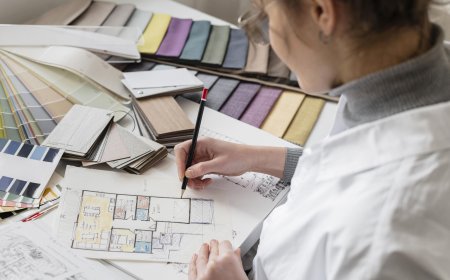Top Skills You’ll Learn at a Leading Interior Design Institute

Interior design is more than just choosing colors and arranging furniture. It's a powerful blend of creativity, technical knowledge, and strategic thinking. A leading Interior Design Institute offers students a well-rounded education that prepares them to thrive in a competitive industry. Here are the top skills you can expect to develop as part of your journey:
1. Space Planning & Layout Optimization
Youll learn how to analyze spaces and develop functional, aesthetically pleasing layouts. From open-plan offices to compact urban apartments, space planning is foundational to every project.
2. Color Theory & Material Selection
Understanding how colors interact and how materials influence mood and usability is essential. Youll explore color psychology, material sourcing, and how to create harmonious palettes that support the purpose of each space.
3. Design Software Proficiency
Modern design work relies heavily on digital tools. Institutes train students on industry-standard software such as:
-
AutoCAD (2D drafting)
-
SketchUp or Rhino (3D modeling)
-
Adobe Creative Suite (Photoshop, Illustrator, InDesign)
-
Revit (for BIM and architectural workflows)
4. Technical Drafting & Construction Documentation
Interior design isnt only about aestheticsit also involves working closely with architects and contractors. Youll learn how to create detailed technical drawings and construction documents that bring your vision to life.
5. Lighting Design
Lighting has a massive impact on the ambiance and functionality of a space. Youll study both natural and artificial lighting, and how to layer lighting (ambient, task, and accent) effectively.
6. Human-Centered Design & Ergonomics
A great design serves the people who use it. Institutes emphasize user experience, comfort, and inclusivity, teaching you how to design for diverse needs and body types.
7. Sustainability & Eco-Conscious Design
Sustainable design is no longer optionalit's expected. Youll explore eco-friendly materials, energy-efficient planning, and how to design spaces that reduce environmental impact.
8. Historical & Contemporary Design Styles
Understanding design history helps you create spaces with depth and context. You'll explore movements like Bauhaus, Mid-Century Modern, Art Deco, Minimalism, and more.
9. Communication & Presentation Skills
You'll learn how to present your ideas clearlywhether through sketches, mood boards, physical models, or verbal pitches. Strong communication is essential for collaborating with clients and professionals.
10. Project Management & Client Handling
Interior design projects are complex and deadline-driven. Institutes teach you how to manage timelines, budgets, client expectations, and vendors with professionalism and clarity.
Conclusion: More Than Just Design
A leading Interior Designing Institute gives you more than a set of artistic skillsit empowers you with the confidence to manage real-world projects, the tools to innovate, and the discipline to turn ideas into reality. Whether you dream of designing luxury homes, commercial spaces, or sustainable environments, the right education can set the stage for a thriving creative career.






































